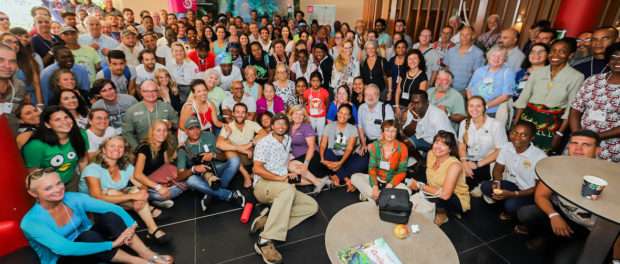Birds Caribbean Conference Highlights Lessons Learned from 2017 Hurricanes
Get our headlines on WHATSAPP: 1) Save +1 (869) 665-9125 to your contact list. 2) Send a WhatsApp message to that number so we can add you 3) Send your news, photos/videos to times.caribbean@gmail.com
 Over 250 delegates attended the 22nd annual BirdsCaribbean International Conference in Guadeloupe. (Photo Parc national de la Guadeloupe)
Over 250 delegates attended the 22nd annual BirdsCaribbean International Conference in Guadeloupe. (Photo Parc national de la Guadeloupe)
August 12, 2019—Le Gosier, Guadeloupe—The BirdsCaribbean International Conference takes place every two years in a different Caribbean location. This year, over 250 delegates came to Guadeloupe from 34 countries and islands. Much of the focus was on the major hurricanes of 2017 and their impact on birds, landscapes and people.
The members of BirdsCaribbean include teachers, scientists and conservationists. All three groups have learned important lessons over the last two years and shared them at the conference. The topic was explored over five days of keynotes, talks, field trips and workshops.
Much research has been done after Hurricanes Irma and Maria. On Barbuda, researchers were relieved to find the Barbuda warbler still present. It is a small songbird that lives only on Barbuda and nowhere else in the world. Others shared their studies of the recovery of wild spaces, from mountain forests to salt water lagoons. Hannah Madden presented on the decline of the Bridled Quail-Dove on Statia. Its population dropped by about 75% since the storms.
Educators also shared their experiences. On many islands, bird education efforts were tricky after the storms. But many teachers made strong connections with people during this time. Many people felt closer to nature after the storms. Jenn Yerkes presented on work done by Les Fruits de Mer and other St. Martin groups to help people connect with birds and nature after Irma.
The chance to help birds was often a bright spot during a tough time. BirdsCaribbean and partners on eighteen islands gave out over 4,000 bird feeders and five tons of bird seed after the storms.
The storms also influenced efforts to save and protect birds and wild spaces. Although hurricanes are natural, their impact is more severe when natural areas are already under stress. Members started a new working group learning to restore habitat with native plants. In the long term, healthier wild spaces are more resilient. They also protect people from floods, storm surge and landslides.
With over 100 sessions and talks, many other topics were also explored during the week, such as the role of sustainable bird tourism in conservation and a special celebration of Guadeloupe’s birds. BirdsCaribbean also started a mentor program to help young people working with birds and conservation in the region. A new generation of members is one of the most important resources for the region.
The conference was made possible by many sponsors, including Parc national de la Guadeloupe, Karibea Beach Hotel, Environment Canada, US Forest Service International Programs, Royal Society for the Protection of Birds, Para la Naturaleza, Benjamin Olewine IV, The David Webster Charitable Trust, American Bird Conservancy, Caribbaea Initiative, Rare Species Conservatory Foundation, U.S. Fish and Wildlife Service, Wildside Nature Tours, Carefree Birding, Holbrook Travel, Optics for the Tropics, NuStar, Vermont Center for Ecostudies, Vortex Optics, International Fund for Animal Welfare, Bermuda Audubon Society, Environment for the Americas, Levesque Birding Enterprise, AMAZONA, The Friendship Association, and Hideaways of Ti Bay Hieghts. More information about the conference is available at the conference website: http://birdscaribbean.org/bc2019/
About BirdsCaribbean
BirdsCaribbean is a vibrant international network of members and partners committed to conserving Caribbean birds and their habitats. We raise awareness, promote sound science, and empower local partners to build a region where people appreciate, conserve and benefit from thriving bird populations and ecosystems. We are a non-profit (501 (c) 3) membership organization. More than 100,000 people participate in our programmes each year, making BirdsCaribbean the most broad-based conservation organization in the region. You can learn more about us, our work, and how to join at: http://www.birdscaribbean.org.
Leave a comment
You must be logged in to post a comment.